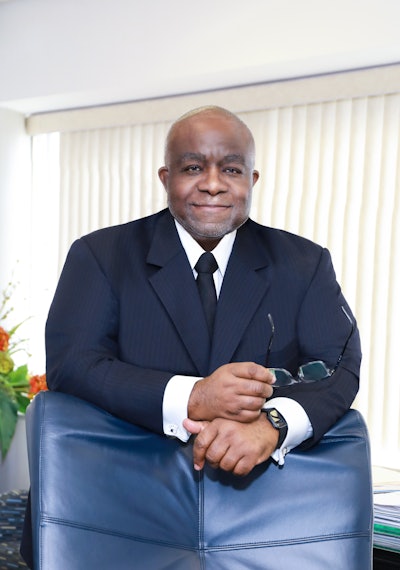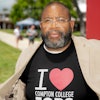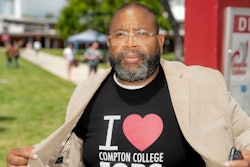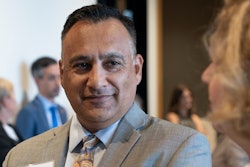Although he tends to downplay his prominence, there is no question that Dr. Curtis L. Ivery has become somewhat of a celebrity in Detroit, using his high-profile status as the chancellor of the Wayne County Community College District (WCCCD) to champion opportunity and educational equity for the 70,000 students enrolled at the multi-campus college.
And in doing so, Ivery — who is one of the longest serving community college leaders in the nation — has dramatically helped raise the visibility of a struggling city on the verge of a second renaissance.
“Dr. Ivery has a serious commitment to helping the low-income population that universities can’t retain or prefer not to admit,” says the Reverend Charles Williams II, a community leader and senior pastor of Detroit’s Historic King Solomon Baptist Church. “He has stood firm on the premise that everyone should have access to an educational opportunity that will launch them into the middle class. To some it’s a first chance and others it’s a second chance, but to everyone it’s a life-changing opportunity.”
If you crisscross the region and indeed the country, you’ll hear similar accolades for Ivery, who has been at the helm of WCCCD for 25 years and has been the institution’s most vocal cheerleader. He’s credited with transforming the six-campus institution — stretching across 36 cities and townships and more than 500 square miles — into a national model lauded for its high enrollment and impressive completion rates. In addition, his scholarly research on urban and minority issues — specifically those that impact African American males — has won him widespread recognition and a litany of awards and honors across the years.
Ivery is self-effacing when it comes to talking about himself, but his body of work speaks for itself. In addition to serving on numerous boards including chairing the Wayne County Airport Authority, he is the author of a number of books including Reclaiming Integration and the Language of Race in the Post-Racial Era; America’s Urban Crisis and the Advent of Color-blind Politics: Education, Incarceration, Segregation and the Future of U.S. Multiracial Democracy; and Black Fatherhood: Reclaiming Our Legacy, which he co-authored with his son Marcus, along with a series of children’s books he co-authored with his daughter Angela.
 Dr. Curtis L. Ivery
Dr. Curtis L. IveryNearly two decades ago, Ivery and his wife Ola formed the Curtis and Ola Ivery Literacy Foundation to support educational scholarships and early childhood development programs such as The Bookworm Club and the Children’s Reading Carnival, which impact thousands of children across Wayne County each year. Proceeds from all of Ivery’s books go to the foundation.
A self-professed workaholic who keeps a notepad on the nightstand to jot down ideas, much to the dismay of his wife, Ivery isn’t showing any signs of slowing down. Sitting at his office desk headquartered in a building that now bears his name, he rattles off a number of new initiatives that he’s actively working on, including securing robots for his students to work with. There’s more work to be done, he says with a broad smile, and those who know him say he’s just the person to get things done.
“The issues today are different than they were 25 years ago,” says Dr. Christine McPhail, a veteran college administrator and former community college president who has worked closely with Ivery. “He is building an infrastructure of support and being innovative and looking at new and different ways to carry out the mission of the institution.”
This includes constructing new buildings and renovating old ones, recruiting new faculty to teach at the college — last year he hired 26 new professors — and expanding academic programs that focus on cybertechnology and mechatronics. Fiat Chrysler Automobiles, for example, recently partnered with WCCCD to create an automotive manufacturing co-op for an associate degree that combines academic coursework with one to two days of paid job experience per week.
Last year, more than 1,900 students earned their degree from WCCCD, which was founded in 1967. Additionally, the school received the highest vote of confidence from the Higher Learning Commission of North Central Association of Colleges and Schools which affirmed their accreditation for the next 10 years.
At a time when overall enrollments continue to dip at community colleges across the nation, WCCCD’s numbers have remained remarkably strong, even after Detroit suffered through the largest municipal bankruptcy in American history in 2013.
“It was just a perfect storm for Detroit,” remembers Ivery, adding that when employees who worked in the city’s three largest automobile manufacturers — General Motors, Ford Motor Company and Fiat Chrysler Automobiles — were leaving their plant jobs in droves amid layoffs and downsizing, they needed to be “reeducated, retrained and redirected.”
They found a welcoming home at WCCCD.
Committed to access and opportunity
Ivery has long been intentional about ensuring that underserved populations throughout Detroit have access to the college. And he’s directed his staff to aggressively court these students.
“We’re out there knocking on the doors and talking to people directly,” he says about the recruiting efforts that the college employs to bring in new students, about 70% of whom qualify as Pell-eligible. When Detroit Public Schools did not have the budget to offer high school students the opportunity to take college courses through dual enrollment — similar to what was being offered in the more affluent suburbs — Ivery made the bold decision to waive the tuition so that students could enroll.
“I went to my board and said, ‘We can’t penalize these students. We’ve got to let them access dual enrollment,’” he says. “We did it before it was popular.”
At a time when fiscal resources in Michigan have become increasingly scarce, Ivery has demonstrated time after time his ability to work with key stakeholders, including state legislators, to secure the needed finances for WCCCD, all the while keeping the institution financially afloat. This spring, the college will open a $30 million health and wellness center at its downtown campus. The 80,000-square-foot state-of-the-art building will offer training for students in fields such as biotechnology, hydroponics, fitness training and sports management.
“He’s a compassionate leader,” says Dr. Ella J. Davis, a professor of
English, speech and African American studies at WCCCD. “He’s accessible, terrific with the faculty and students and his leadership has led to the college receiving national recognition for our ongoing success. He’s all about creating opportunities.”
Davis, who has been at the college for about as long as Ivery, credits him with working alongside the many unions that represent WCCCD employees to ensure that faculty and staff received robust, across-the-board pay raises and hefty benefits over the years. She says that Ivery has made it his personal mission to build a leadership pipeline at WCCCD by encouraging and supporting faculty with master’s degrees to go on and earn their doctorates through a partnership with the John E. Roueche Center for Community College Leadership at Kansas State University.
Moving to Detroit
Back in 1995, there was no logical reason for Ivery, who had already emerged as a national thought-leader, to accept the top post at WCCCD. The institution was mired in financial turmoil and student enrollment was steadily on the decline. At the time, he was vice president of instruction and acting president at Mountain View College, which was part of the Dallas County Community College District (DCCCD). Prior to that post, he served for five years as vice president of instruction at El Centro College, the oldest of the seven colleges within DCCCD, and worked on four campuses across 11 years, educating himself on the mechanics and significance of a multi-campus institution.
His bona fides also included serving as commissioner of human services for the State of Arkansas, managing more than 3,000 employees and a budget in the tune of one billion dollars annually. He was the first African American and the youngest appointee to serve in the cabinet of then-Governor Bill Clinton.
“When he first started interviewing and talking about the Wayne County District, several of us who were his friends advised him against taking the job,” says Dr. Walter G. Bumphus, president and CEO of the American Association of Community Colleges. “Several folks that I knew at the time were good leaders, but they all ran into some major issue or had gotten fired. Not a lot of people were retiring from Wayne County after twenty years of service; rather they were being unfortunately let go, and so you really didn’t want that to happen to somebody you respected and you really liked, like Curtis.”
When he finally committed to taking the job, Ivery told his wife that he would only serve in the role for two years and then move on. A quarter century later, he’s still there.
“I saw the potential,” he says, adding that he rolled up his sleeves and got to work on developing a strategic and communication plan and began reaching out to Detroit’s diverse populations, including airing television and print ads in Spanish and Arabic. He was praised by the local media for transparency. He opened the financial books, posted every expenditure on the website and received clean financial audits with no findings year after year.
Ivery has not only lasted longer than any other president or chancellor in an urban environment, says Bumphus, “but has thrived as well or better than any other urban chancellor or president that I have known.”
The secret to his success, Bumphus adds, is that Ivery decided early on to restructure WCCCD after the successful community college model in Dallas.
“He absolutely used Dallas as a model, and Dallas at that time was one of the finest districts in the country and it is still a great district,” says Bumphus, who was president of Brookhaven College, which is part of DCCCD, and worked closely with Ivery during his years there. “But Curtis has certainly made the Wayne County Community College District one of the finest urban districts in the country without a doubt.”
Still, the transition was not easy. Back then, morale was low and
 Ivery with then-Arkansas Governor
Ivery with then-Arkansas GovernorBill Clinton who appointed him to a cabinet
position.
students frequently sought him out to register their complaints.
“At the time, among community colleges in Michigan, we were the lowest as far as funding,” he says. “On almost every index, we were at or near the bottom.”
He recalls a group of students showing up to his office one day in tears a few weeks into the job. Whenever it rained, they told him, their classroom flooded and they wanted assurances that he would fix the problem.
“We created a capital improvement plan, a 20-year plan and spent millions of dollars to put new structures in place in every location,” says Ivery, who currently oversees an annual operating budget of about $130 million and a $650 million capital improvement program. “Every project we finished on time and under budget.”
Ivery says that his longevity as a college administrator is directly linked to his love for the students he serves.
“We can’t be apologetic,” he says. “We can’t be intimidated by politics because we will always be a political football. If you are a large, urban center, it’s going to be political.”
On becoming a leader
Growing up in rural Amarillo, Texas, Ivery experienced what it meant to be poor. Though he was the first in his family to go on to college, his parents emphasized the importance of a quality education.
“I was fortunate that my parents believed in college as a way to live a better life,” he says, noting that his father, in particular, had a strong work ethic, often demanding that his children rise at 6 a.m. so that they could see him getting dressed for work. “My father never missed a day of work to my knowledge. He lived his life in a way that he would expect for us to live.”
But there were difficult and painful memories, too. And at a young age, Ivery turned to writing as a coping mechanism.
“I find I have the ability to put things in writing that I could never talk about,” he says. “I never talked about the underlying struggles and pain. I couldn’t talk about that, but I could write about it, and in the process of writing about it, I began to understand that some indignities were unbelievable.”
His grandfather, who lived to be 106, taught young Curtis the importance of being strong.
“He would talk to me about education and the importance of reading and studying,” even though he had no formal education.
Football was Ivery’s ticket out of Amarillo, and at the height of the civil rights movement, he was among the early wave of Black students to enroll at Texas A&M University-Kingsville.
“I would have never gone had it not been football,” he says. “After I got there, I realized there was so much more than only football. I greatly enjoyed the classwork.”
Despite becoming the first elected Black president of the student body, a college dean had tried, unsuccessfully, to persuade him and his Black roommate to drop out of school, claiming they were not taking their studies seriously.
“I found it amusing because it wasn’t new to me. We thought it was funny,” he recalls. “But what it did, was it made me even more determined.”
After earning a Ph.D. in higher education from the University of Arkansas and a successful stint working for Clinton that catapulted him into the big leagues, Ivery knew that a college presidency was certainly within his reach.
“I just have always been a leader,” he says. “I don’t ever remember being a follower. I always knew how to work with others.”
 Ivery with President Barack
Ivery with President BarackObama
Leaving a legacy
Last spring, WCCCD’s Board of Trustees held a dedication and naming ceremony for the new Dr. Curtis L. Ivery Central Educational Complex in downtown Detroit.
WCCCD’s Board Chairperson Mary Ellen Stempfle told the crowd that included community, city and state officials that the dedication was long overdue.
“The naming of the complex recognizes the profound and transformative leadership of Dr. Ivery and the indelible mark that
he has made on countless lives through his unwavering focus on providing doorways to better lives through higher education,” she said.
Although well-deserved, Ivery seemed uncertain about all the fuss.
“I grew up not believing that I could have those things,” he says, reflecting back on his humble upbringing. “It wasn’t supposed to happen to me. Do you call it humility? Or do you call it fear?”
But the recognition is nonetheless fitting, says those who have followed his illustrious career.
Diverse: Issues In Higher Education has named Ivery as the recipient of its 2020 Diverse Champions Award, which recognizes community college leaders who have shown an unwavering commitment to equal opportunity and access for all, particularly at the community college level.
“His long-term leadership in community colleges nationally has been based on values which have highlighted social justice, equality and an appreciation of differences,” says Dr. Jerry Sue Thornton, president emerita of Cuyahoga Community College in Cleveland and a past recipient of the Diverse Champions Award. “Throughout his career, he has lived the values that undergird this award.”
As he makes his way across the city each day, it’s not uncommon for strangers to buttonhole him in an elevator to strike up a conversation.
“You don’t know who we are, but we sure know who you are,” a couple recently told him after he was heading home from a long day at work.
Those kind words serve as an affirmation that Ivery is making a difference.
“When I talk about curriculum and outcomes, it’s not abstract to me,” he says. “Nothing replaces the passion and love I have for people. I really sincerely believe that education is the only way out. And I don’t stutter about that. I am so committed to that.”
This article originally appeared in the April 2, 2020 edition of Diverse. You can find it here.
Jamal Eric Watson can be reached at [email protected]. You can follow him on Twitter @jamalericwatson
















